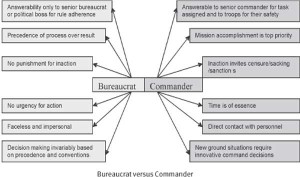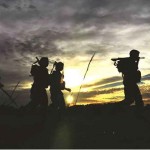In the absence of any quantifiable and measurable performance matrix, promotions are decided on the basis of adherence to procedures and ability to swim with the system without causing any ripples. Seniority and not merit becomes the primary criterion for advancement in career. Non-performance is preferred to initiative. It is often said that a fresh IAS appointee, if put in deep freeze and taken out after 15 years will be a Joint Secretary. Moreover, he will be regarded highly as he would have taken no decisions and rocked no boat.
Commanders
Military, on the other hand, is a purely mission oriented organisation. As accomplishment of mission is totally dependent on the performance of the men under command, a military leader assumes the role of mobiliser and channeliser of human effort. Initially, a military leader gets command of his troops through official mandate. However, his standing and ability to gain obedience depends entirely on the credibility he establishes through his personal conduct and competence.
 Military command thus, entails two dimensions – achievement of assigned objective and welfare of troops under command. He cannot fail in his task as it may have an adverse effect on the very security of the nation. Simultaneously, he cannot ignore well being of his men. Dealing with human beings with their complex apprehensions, concerns and aspirations calls for extreme empathy and loyalty. Command implies close contact with troops and awareness of their needs. A commander becomes responsible not only to his superiors but also to his troops who place their trust in him. Trust is the expectancy that the followers can rely on a commander’s competence, impartiality and sincerity. As a commander has to face his followers, he cannot seek anonymity and hide behind faceless files.
Military command thus, entails two dimensions – achievement of assigned objective and welfare of troops under command. He cannot fail in his task as it may have an adverse effect on the very security of the nation. Simultaneously, he cannot ignore well being of his men. Dealing with human beings with their complex apprehensions, concerns and aspirations calls for extreme empathy and loyalty. Command implies close contact with troops and awareness of their needs. A commander becomes responsible not only to his superiors but also to his troops who place their trust in him. Trust is the expectancy that the followers can rely on a commander’s competence, impartiality and sincerity. As a commander has to face his followers, he cannot seek anonymity and hide behind faceless files.
Transition from Commander to Bureaucrat
As seen above, whereas a bureaucrat is a faceless and remote entity, a commander is in direct contact with his troops. Therefore, traits required for the two are totally different. Many military officers, when in command of troops, earn reputation for being go-getters and achievers. They deride bureaucratic delays and want higher authorities to be more prompt in decision making. But when posted to higher appointments, they become more bureaucratic than the career bureaucrats. The switch over is amazingly swift.
Some of the commonly recognised factors that contribute to the conversion of psyche, approach and conduct of commanders are discussed below:-
Prolonged Absence from Direct Command of Troops. Command of troops is tough, challenging and risky. Many officers are wary of command tenures as they fear exposure of their incompetence. They prefer to play safe by doing minimum mandatory terms and revert to higher headquarters in good peace stations. Prolonged absence from command of troops makes them lose touch with ground realities and they become mere file pushers.
Bureaucratic Culture is Infectious. By its very nature of laid back, safe and process-centric functioning, bureaucratic culture is highly infectious. Even highly enthusiastic officers get disillusioned in no time when they find cases moving at a snail’s pace despite their best efforts. Initially they feel frustrated but soon adopt the same culture. Innovative ways are found to ‘put a case in orbit’ by seeking comments of all and sundry to defer taking any definite action.
Upgradation of Appointments. With a view to improve promotional prospects of officers, a large number of appointments have been upgraded. The command structure of the field forces could not be disturbed. Thus, all higher headquarters have become highly bloated and overstaffed. This has resulted in emergence of multiple tiers in decision making and bureaucratized functioning. As every link in the chain wants to remain in the loop and retain its relevance, urgency becomes inconsequential.
Prolonged absence from command of troops makes them lose touch with ground realities and they become mere file pushers.
Zero Error Syndromes.“It is better not to take a decision and play safe rather than take one and risk one’s career,” is the common refrain. Non-acceptance of mistakes committed by subordinates has created an environment of treading warily even in trivial matters. Penchant for playing safe is thus, one of the significant triggers for bureaucratization.
Change in Role Definition. Unfortunately, many officers have a tendency to redefine their role when posted out of command of troops. They feel that their new assignment of managing resources is distinctly different and they disassociate themselves totally from command functions. Change of hat causes change of outlook and mind-set.




